#UWI Mona
Text
making major changes to my university plans.
#dils declares#so it turns out uwi mona DOES have engineering! so i could do a year of their preliminary engineering course#< weird how i can type a hashtag in a tag. anyway#so i could do that and then either use that to apply to an ontario school or stay at uwi#now what i want to know is can i double major in two different kinds of engineering#because it i can do well in that first year i would be willing to stay there and do the 3 year BSc engineering degrees at uwi#but i want to do both
7 notes
·
View notes
Text
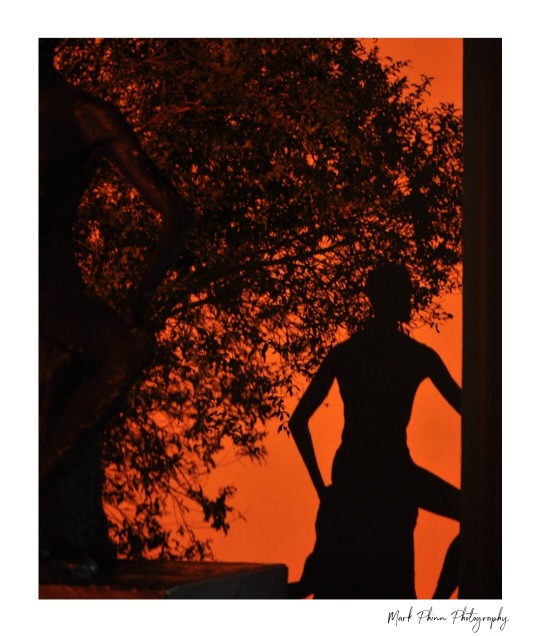
Philip Sherlock Statue, UWI Mona, St. Andrew, Jamaica
Mark Phinn Photography
9 notes
·
View notes
Text
SAVE THE DATE — In celebration of the 90th anniversary of the birth of Prof. Rex Nettleford, you are invited to the inaugural 'Rex Nettleford Distinguished Lecture' on Friday, February 3, 2023, at 3pm at the UWI Regional Headquarters, Mona.

3 notes
·
View notes
Text
Medical Schools in Jamaica
Jamaica is home to several reputable medical schools that offer quality education and training for future medical professionals. Key institutions include the University of the West Indies (UWI), which has campuses in Mona (Kingston), Barbados, and Trinidad, and the International University of the Caribbean (IUC), among others. These schools provide a range of programs, including undergraduate medical degrees (MBBS) and postgraduate specialties.
The University of the West Indies is particularly notable for its comprehensive medical program and its strong emphasis on research, clinical practice, and community health. Its faculty is renowned for its contributions to medical education and healthcare in the Caribbean region.
0 notes
Text
INSIDE THE ARCHIVES: AN INTERVIEW WITH HERBIE MILLER
Out of my personal archives here is an interview I conducted with Herbie Miller – current Director/ Curator of the Jamaican Music Museum (JaMM) – on 27 November 2006. If my memory serves me well, I had been introduced to Herbie Miller a few days before by the late Professor Alston “Barry” Chevannes, sociologist and authority on Rastafari. When I met Herbie, he was completing his PhD in cultural studies at the University of the West Indies (UWI), Mona, Jamaica. His doctoral research dealt with Jamaican ska trombonist Don Drummond. Some excerpts of this interview appear in my book, Vibrations jamaïcaines (French language), but it has never been fully published until now. So, fasten your seatbelt and let’s dive into this deep conversation dealing with various topics of interest such as Bob Marley, Peter Tosh, Bunny Wailer, Rastafari, Mortimo Planno, Jamaican politics, the unsolved assassination attempt on Bob Marley, the evolution of Jamaican music and the Rolling Stones among others.
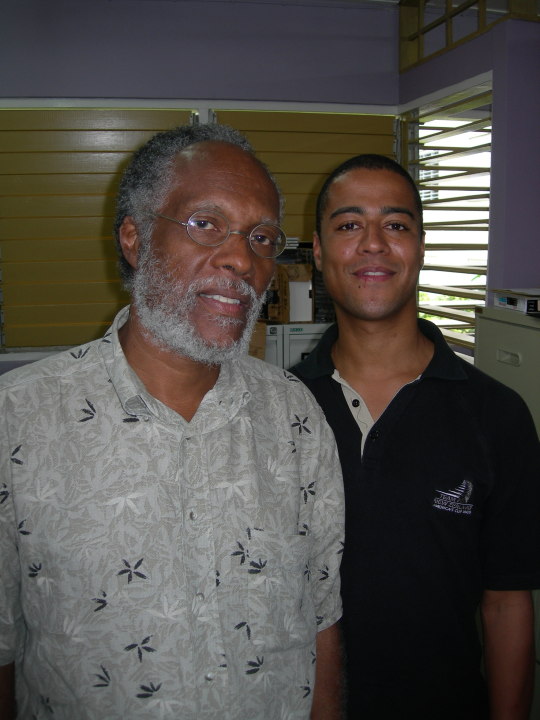
Herbie Miller and me in his office at UWI, 27 November 2006. © JKD
JKD: Hi Herbie, nice to meet you!
Herbie Miller: Nice to meet you Jeremie.
First of all, can you just introduce yourself and tell me the position you hold here at UWI?
Well, I’m Herbie Miller. My position here is in the capacity of completing my own PhD in cultural studies. At present I’m a…God what they call it? There’s a word in some sort of Department, something I am, at this point I’m not even sure of what it is! (Laughs)
(Laughs). I heard that you used to be the manager of Peter Tosh. When exactly?
I managed Peter when he embarked in a sort of career from 1976 to about 1982-83.
Right. You know, Bob Marley, Peter Tosh and Bunny Wailer were friends but had a different personality. Can you tell me the main characteristics of each person and how they differed from each other?
Well, of course, you can see in both Marley’s work and his personality that he was really a thinking musician. He brought a lot of militancy and spirituality to his music. At the same time, he was quite outgoing, he was also quite reclusive. It all depended on what the situation was. He was outgoing in the sense that he went to public events, especially soccer. He went to night clubs and stuff like that. He was private in the sense that, to a great extent, Bob was very withdrawn and shy, I could say. He was quite aware of his stature and who he was and as a result he understood that in many ways he had to secure that self. He couldn’t just go out there as the average citizen. So in that respect he understood his position, his place and guarded it to some extent. Peter, on the other hand, was totally outgoing in every way. Peter was the type of person who went to football games and sport events as Bob and Bunny would. But he was outgoing in that he was a man of the streets. He was not shy, he would talk to people. His personality is perceived as one that is quite extremely militant if not revolutionary. To some, he was angry, to others he was jovial, critical, sensitive, generous, humorous, funny as hell, quite a complex personality Peter was. Bunny is perhaps the more reclusive, remains the more reclusive as a matter of fact [Editor’s note: Bunny Wailer was still alive at the time of the interview in 2006]. As all the fans know, Bunny was the first to give up being a fulltime public figure. He recorded, he was a great soccer player, he has his own community of followers and community in which he’s very relaxed. He was at the same time guarded and it’s perhaps to the extent that he has survived. So, three different types of videos. Get together the main one great if not the greatest unity as a single voice.
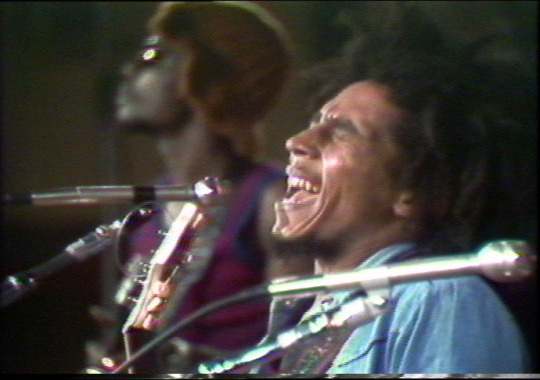
Bob Marley and Peter Tosh at Capital Records, 24 October 1973. © Screenshot from a film directed by Lee Jaffe and Leon Russell
Did they turn to the Rastafari faith at the same time?
I think they all of them embarked on the tradition and self discovery at about the same time. Bunny might have been ahead of Bob and Peter in that respect but I’m not sure. The biographies are out there, the biographic videos are out there, the testaments are out there, I wasn’t that close to know but I do know that all three of them defended the Rastafari faith strongly.
And were the three of them followers of Planno or was Bob Marley the only one?
I think all three embarked on the tradition under Planno’s guidance. I think Bob stick with it and maintains his close relationship to Planno the longest.
Then the relationship between Planno and Marley broke up at some point. Do you know why?
I haven’t a clue. I don’t know about that, no!
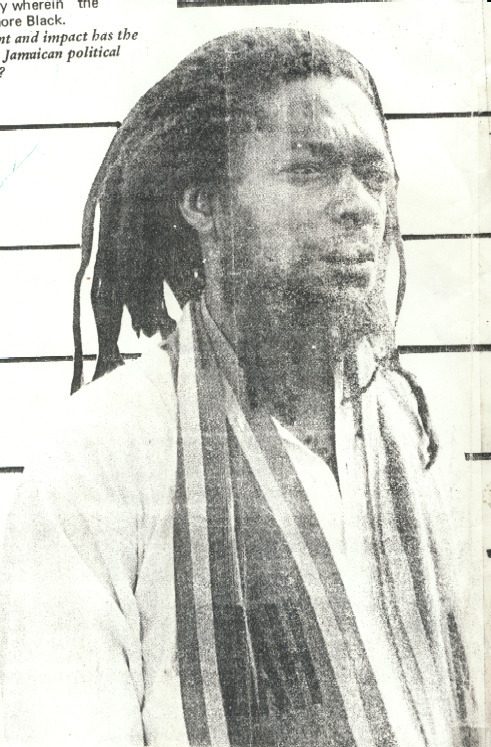
Mortimer Planno in Lagos (Nigeria), July 1979. © Tam Fiofori
So how do you explain that Bunny Wailer and Peter Tosh decided to quit the band after the second album?
Do I have to explain that? They have explained it over and over themselves. There are lots of interviews with Peter where he explains it. You know, Peter basically felt that the three of them were strong in the videos, correctly so. He also knew that as a group they were extremely strong but that the focus on the group had become the focus on Bob Marley. And Peter felt that he needed his own attention. In fact, Peter was the first of the three of them to record solo. He always recorded as Peter Tosh and he always recorded as a part of the Wailers. And it was not put any hard feeling that Peter decided to go on his own. Bunny, on the other hand, had philosophical reasons why he decided to quit. He just thought that he was up to the heavy tour and schedule and at some point felt uncomfortable with some of the places in which they had to perform.
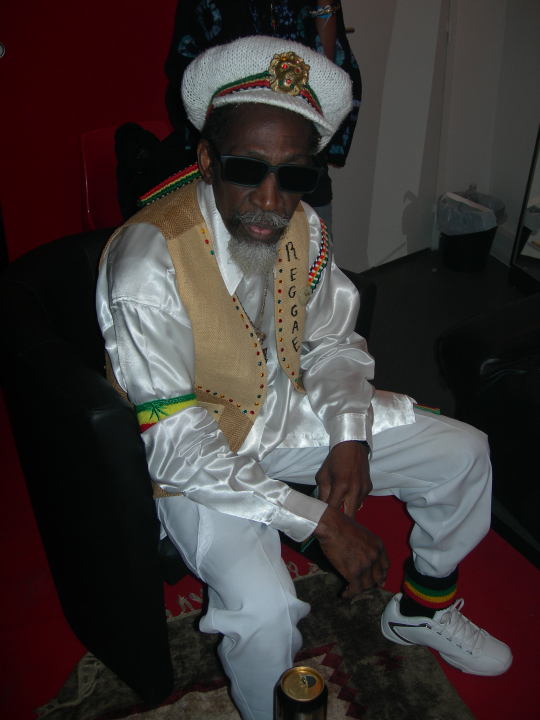
Bunny Wailer backstage at the Zénith Paris, 21 April 2007. © JKD
Do you think that in the 70s, politicians tried in a way to co-opt the Rasta movement and reggae singers?
By the 70s, Rastafari was going through and had gone through a series of oppression on behalf of different governments. And so by the early 70s, with the wind of change blowing in the air, of course it was an advantage for politicians to give some sort of recognition to Rastas; perhaps just stopping short of making the grand promises. And certainly with the closeness to the musicians, and the music, and the people that the politicians had at that point, particularly the PNP, they saw they could really utilize musicians and securing votes. And certainly the musicians reacted to it positively; they participated in political band wagons around the country. That featured some of the best artists of the moment.
"to the vast amount of poor people and sufferers and roots people and Rasta people and African-Jamaican-Black people down there on the ground nothing supersedes the Wailers"
And what was Peter Tosh’s point of view on this situation? Was he cautious regarding the links between politics and artists?
I think the fact that they performed for a particular party reveals a particular mindset or way of thinking or direction in which they thought the politics should head. So by the mere fact that they participated, you know, cautious in the fact that we all are cautious around election time to the extent that we are involved with it or not involved with it, but everybody gets cautious at that time. And so I imagine that, yes, they were cautious, but at the same time they thought that change was necessary and that they could provide people with a direction if they identify with a particular party and what direction that party could head.
You know, Bob Marley was about to be killed at the time of the Smile Jamaica concert. Do you think that there are some links between the election and this assassination attempt?
Of course the world of the streets is of such. The official opinion is that the verdict is still out. You know, it’s one of those things that happened. It’s in the past. It might not be totally settled in terms of who did what? Who sent whom? And so on. I certainly am not private to that information if it is, if it has been declared.
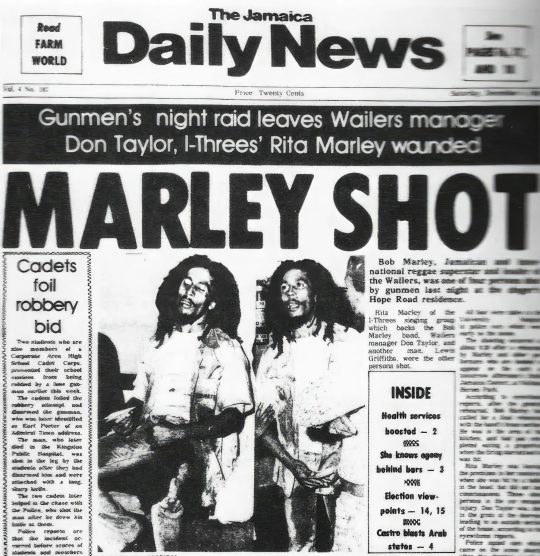
In the late 70s some say that the Wailers were more popular in Europe than in Jamaica. Is it true and if so, do you know why?
It depends on which Jamaica you are talking about! The Wailers have always been popular among a certain group of Jamaicans.
Which group?
The people, people of the streets. They have always been popular whether or not they were played on the radio or they were performing live or even if they were recording at all. The Wailers was the people’s group above every other group. By none! The people who they became popular to later on are those who initially rejected them, who had no use for them, no use for them until the same people talk about them in Europe and abroad accepted them; and say look “This is great!” Then these other set a folks basically up the band wagon. But the Wailers were never unpopular, never unpopular. No, they might not have been in the charts at a given time as others were and among a certain middle-class or elite, but to the vast amount of poor people and sufferers and roots people and Rasta people and African-Jamaican-Black people down there on the ground nothing supersedes the Wailers, none, at any given time.
What’s your general opinion on the evolution of Jamaican music and the new generation of artists?
I think that good things are happening, lots of great things are happening. Jamaican music has never been more internationally popular, meaning to say bursting into the charts, making waves on big radio stations, popping up outside of just the narrow so-called reggae category in the Grammys and all over. Jamaica is attracting musicians of all sorts coming into mix and deal with the music on the new level. They have always come, from the days of ska they have been coming but today it might be commercially much more popular than it ever was. Qualitatively speaking, the tourist is out, ska was not but “boogooyaga” music to the same people who later on embraced the culture because they control the airwaves, they control the newspaper, they control the print, they control everything. And Jamaican culture to them was not reflected in Rasta people and local aesthetics. It was reflected in a Euro-centric foreign taste across the board: clothes, food, music, whatever. To the poors, that be that’s what counted. From ska to rocksteady we still had visitors coming to the island, Paul Simon, Herbie Mann, Aretha Franklin etc. Reggae: Barbra Streisand, Joe Cocker, Eric Clapton, Taj Mahal and this goes on. And today with a new breed of music makers and music appreciators, they have hip-hop and rap and dancehall reggae. And those are the people; that’s happening today. The same people ant the same set of folks in the same Jamaican society are calling everything else but artists. That put them down, they say “this the sing, talk, chat, slackness and so on”. I don’t know, I don’t even understand some of what them say, all I know is the beat to most of the song really grab you. And if the beat grabs you at some points you try to figure out if you’re dancing to youth calamity or you’re dancing to glory. You know, young guys such as yourself, I’m sure, can relate to what’s going on, especially if you bash down class and race and barriers such as those that prevent people from all heartily accepting change. Because this really is changing, nothing stands still! Rock time music turning to boogie-woogie music turning to big band music, turning to bebop music turning to hard bop, along the way are the way up to the 60s, Coltrane and Ernest Goodman, at every point of that change there were people critics and some musicians who say that is crap. Louis Armstrong called Dizzy Gillespie Chinese music. So we’ll never get rid of that! Some classic reggae artist from the 70s, I’m sure, are calling this music trash. We don’t know, I don’t know! I am waiting to see out. But I know there are lots of good things out there.
But it seems that artists from the 70s like Max Romeo or the Gladiators are more popular in Europe than in Jamaica today. Why according to you?
That’s not a strange thing, you know? In Europe, 1960 soul artists are still making headline gigs. At home, they stay at home and watch TV. Nobody cares about them at home in America. I remember when…what’s his name again? He was doing in New Orleans a song called “Get Out of My Life, Woman,” I think Dorsey was his last name.
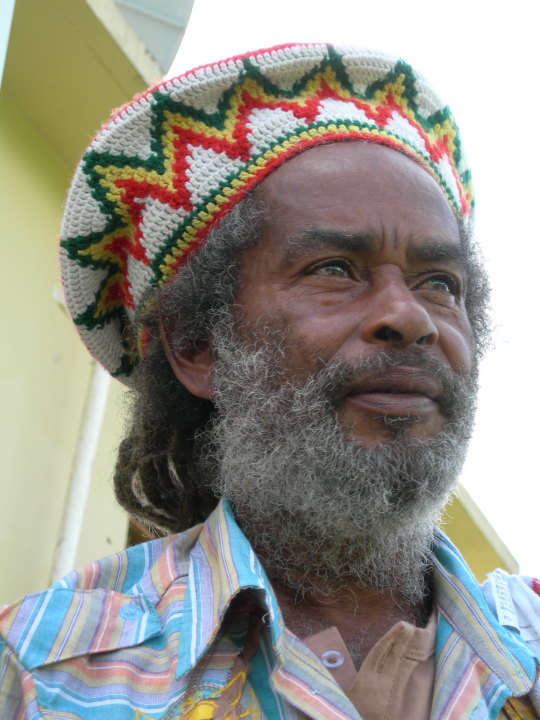
Max Romeo at home (Linstead, Jamaica), 21 November 2006. © JKD
Lee Dorsey?
Yes, that’s it, Lee Dorsey. He was a mechanic in America but a headline in Europe. Lee Dorsey was his name, a headline in Europe but a mechanic in New Orleans, who cares? Blues singers were the same, they could make a big gig over in England, Muddy Waters, Howlin’ Wolf,all of them, but in America nobody really cares. It’s the same thing with the reggae thing. Nobody cares about Burning Spear performing down the year, Jimmy Cliff just performed for the first time in many years. Most of these great artists in spite of…you see here is the cutting edge place, this is where the new trends take place. They establish things with a firm whole, they are over in Japan, they are over in Africa, they are in Europe, in South America, the classic guy that’s where they are. Soon or later, Buju, Capleton, Bushman, Sizzla, those I think are some of the stronger ones today. Certainly, in my estimation, they will become classic performers and whatever will replace them, somebody will be asking “You think that this music is as good as dancehall music?” “How come dancehall artists are not performing in Jamaica any more but only in these other places?” And that what will happen like everything else! Things change but there are all just ska children.
I’d like to have your opinion on another topic. You know, lots of artists sing about Africa and the back-to-Africa movement, but it seems that actually just a few of them truly go to Africa.
I think the song of Africa that comes out of reggae artists and that comes out in reggae songs is a way to deal with the fact that we, in Jamaica, especially those of us influenced by Rastafari’s thinking and Marcus Garvey’s thinking, have always seen Africa as the original homeland. I don’t think it’s so much that any of them necessarily have to or perhaps even want to live in Africa. I think they live in Africa inside of their heads. Once you can come to grips with the idea that they are sons and daughters of Africa, I think the level of comfort is a relaxed one. The tension arises when they can’t figure out who they are. The fact is that they are Jamaicans. The world view of that particular Jamaica is that is in Africa, not necessarily living in Africa or having to live there. They sing about it, about the past, the history and when Burning Spear says “Do you remember the days of slavery,” Spear isn’t asking as if to say “he read about it or heard about it,” he asks that question in such a way as if to say “I remember because I was there” and when he asks he wants you and us to remember as if we were also there because the fact is that we were there. So this is a sort of cultural, historic memory, a sort of collective memory if you will that allows that sort of language to emerge. Not I was told about it or I learnt about it or I read about it but I remember it! When Third World say “96 degrees in the shade” it’s like they know what they are talking about. They didn’t learn that in school and so on. Hence the relationship to Africa and colonization is a mental thing, you’re decolonising your mind and set yourself free. Marley said in “Redemption Song” “Emancipate yourself from mental slavery/ None but ourselves can free our mind.” So those are profound philosophical reasonings to deal with that situation. And that’s why they sing so much about it. Whether or not they go to Africa to perform is based on the fact that if you get invited to go perform somewhere you go. But artists don’t pick up themselves and just say “I want to go perform in Europe….” And of course Africa isn’t set up like that. The rest of Europe is perhaps set up and you can just pick up the phone and book an agent and blah blah blah. Probably where in Europe some African companies say “Man come play in my town…”..there is no big organized music industry in Africa to deal with it the way we deal in Latin America and Europe and Japan. Everywhere else you take a chance as long as you go. You feel it and for better or for worst you deal with it.
So I’d like to conclude this interview with a few questions on Peter Tosh. First, when you toured with the Rolling Stones, did they get along together?
They got along great, you know, they really got along fine. They were a bunch of crazy guys the Stones and… We toured together, we worked together, Peter was signed to their label, we ate together, we did things together… You know, the Stones basically brought Peter internationally so we had to be close. And that just came about because they wanted to sign Peter when he was available for signing at the end of his contract with CBS Records, now Sony Music. And they expressed that opinion through a mutual friend that Sony had. We negotiated to do them and I made the deal.
When did you tour exactly?
It was in the late 70s I believe. It was the year Mystic Man came out. I think it was around 77-79.
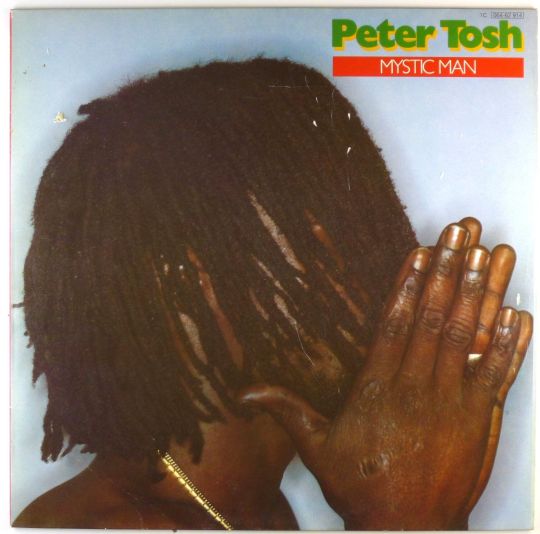
© Peter Tosh, Mystic Man, 1979, Rolling Stones Records - 1C 064-62 914
So it was good times?
It was real good times. It was a time when you could see growth, you could see the things moving from point A onwards, growth was visible.
And the Stones came to Jamaica?
Oh Yes. In fact, I think Keith had a place here and he still comes here. He came just to chill out and hang out with Peter and stuff like that.
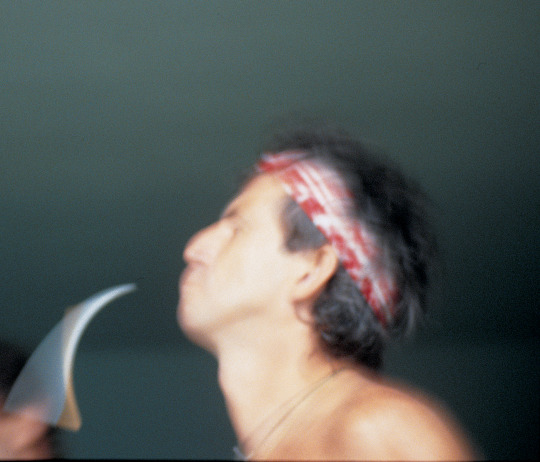
Keith Richards, Ocho Rios. © Lee Jaffe
Peter was as you said very radical and he also used to criticize the Establishment openly and stuff like that. Do you think that he might have been assassinated because of that?
Many theories fly around. I myself was not involved with Peter at the time that happened, unfortunately. It was an unfortunate incident. I don’t know what was happening with his new management people. What I do know is that there was some sort of stand off, he wasn’t recording, he wasn’t touring. They obviously wanted him to record and tour. I know that there was some sort of lawsuit that apparently he won. People demanded money at his house and…perhaps it was just a robbery. I’ve heard assassination theories, I’ve heard the government theories, I’ve heard the drugs theories that one I can without any doubt tell you Peter would not be involved with. Peter smoked weed, that’s it! Nothing else. He doesn’t sell it. He gives it away. He doesn’t trade in it and as far as I know, as long as I was with him, I have nothing to do with people who were involved that way. So all these arguments about Peter both somebody taking a rob from Peter, I don’t buy that.
My last question deals with his famous M16 guitar for sale on eBay [Editor’s note: in November 2006, Peter Tosh’s M16 rifle-shaped guitar had been posted on Internet auction site eBay before being called off]. May I have your point of view on that?
You can read my point of view, it came out, it was the second article about it in the Jamaica Observer. If you read this second piece which came out in the Jamaica Observer, some two weeks ago, you’ll see exactly how I feel about it.
You feel sad I suppose?
More than sad, I feel totally upset. When you’ll read it you’ll see exactly how I feel. Read it! (Laughs).
Thank you for your time Herbie.
You’re welcome Jeremie. You’re welcome.
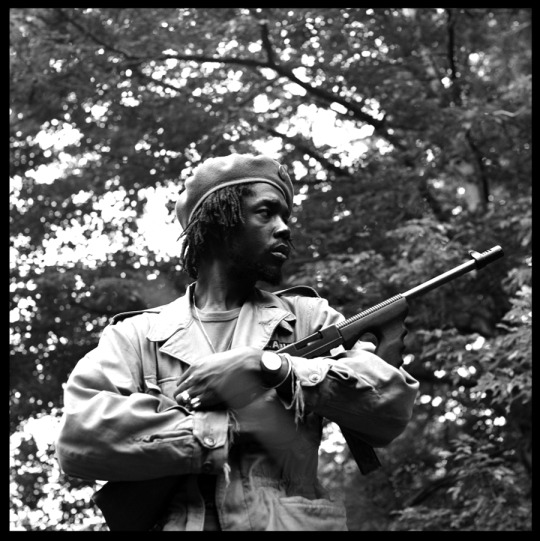
Peter Tosh, 1976. © Lee Jaffe
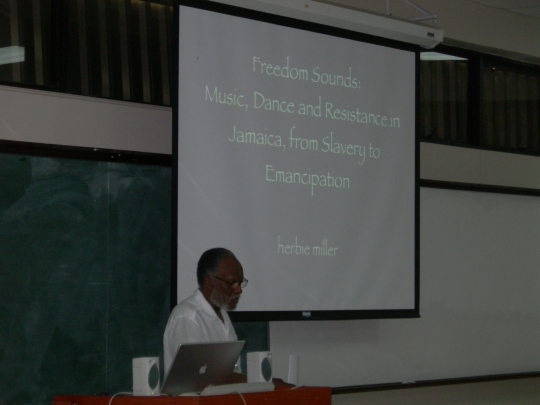
Herbie Miller giving a lecture at the ACS Crossroads Conference, July 2008. © JKD
© JKD, 27 November 2006, Kingston.
0 notes
Text
0 notes
Text
Interns tap into full-time tech roles at NCB | News | Jamaica Gleaner
0 notes
Text
We Have Highlights From The @JamaicaEsports Grand Finals!
Last weekend (September 30), the Jamaica Esports Initiative (JEI) along with the National Esports League kicked off their grand finals event. Held at The Confucius Institute at UWI Mona, attendees entered into a world of competitive gaming, Cosplay, and more, and it was fun for all ages. The main event featured teams from around Jamaica competing for trophies, prizes, and bragging rights in…
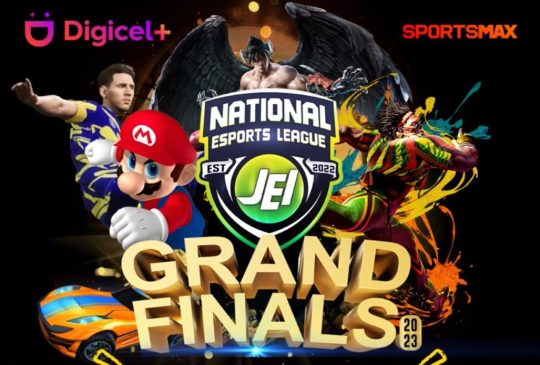
View On WordPress
#13thstreetpromo#13thstreetpromotions#anime#AnimeCom Festival#blog#Cosplay#ESports#Fifa#Gamers#Gaming#Highlights#jamaica#Jamaica Cosplayers Club#Jamaica Esports Initiative#jamaican#JEI#music#National Esports League#Rocket League#Street Fighter 6#Tekken 7#UWI Mona#video#Video Game#youtube
0 notes
Photo

In 2021 as President of the @UWIMonaGuild, I launched an accessibility grant for students with disabilities. It is valued at $100,000 per year. Only 1 payout has been made due to lack of applications. If you know a UWI student with disability, please encourage them to apply. The application can be found here: https://www.mona.uwi.edu/osf/scholarships/uwi-mona-guild-accessibility-grant (at ScholarshipJamaica.com) https://www.instagram.com/p/CqLcce3u_Kj/?igshid=NGJjMDIxMWI=
0 notes
Photo

Today has been such an awesome day I decided to take a selfish as I settle down to unwind after rehearsal for my.play Bathroon Graffitti Queen, working with some talented students at UWI Mona. #opalpalmeradisa #knowyourauthor #grateful #selfrealization #jamaicanwriters #plays #theatre (at Kingston, Jamaica) https://www.instagram.com/p/CpWEfPDr-Y7/?igshid=NGJjMDIxMWI=
0 notes
Text
“Deep Sea Matters!” – Come view, learn, think, discuss, create, exchange views, at UWI Undercroft, January 26 — Petchary's Blog
“Deep Sea Matters!” – Come view, learn, think, discuss, create, exchange views, at UWI Undercroft, January 26 — Petchary’s Blog
Deep Sea Matters! Stop Deep Sea Mining! A special event to take place at the Undercroft, University of the West Indies Mona Campus in Kingston on Thursday, January 26, from 11:00 a.m. to 3:00 p.m. Learn, discuss, participate!
“Deep Sea Matters!” – Come view, learn, think, discuss, create, exchange views, at UWI Undercroft, January 26 — Petchary’s Blog

View On WordPress
0 notes
Text
UWI pursuing opportunities for short-term student exchange with black colleges and universities in US
UWI pursuing opportunities for short-term student exchange with black colleges and universities in US
The University of the West Indies (UWI), Mona, is exploring opportunities for collaboration with tertiary institutions in the United States, particularly Historically Black Colleges and Universities (HBCU), to facilitate short-term study abroad.
Pro-Vice-Chancellor and Principal of the Mona campus, Professor Dale Webber, made the disclosure during the recent ‘Let’s Connect’ town hall hosted by…
View On WordPress
0 notes
Photo

“Be Happy in your own skin” Noel Bell ••••••••••••••••••••••••••••••••••••••• #motivationalquotes #motivational #motivation #motivated #friday #fridaymotivation #qoutes #quoteoftheday #qotd #quotestoliveby #blackandwhite #statue #art #fineart #fineartphotography #potd #uwi #humanity #dance #dancinglady #mona #art #aotd #artist (at Kingston, Jamaica)
#fineart#mona#friday#motivation#motivated#quoteoftheday#fridaymotivation#art#dancinglady#statue#blackandwhite#fineartphotography#motivationalquotes#potd#aotd#motivational#uwi#qotd#artist#qoutes#humanity#dance#quotestoliveby
1 note
·
View note
Text
Densil Williams leads race for UWI Mona principal, claims insider | News | Jamaica Gleaner
0 notes
Photo

One of Portland’s many gems: Blue Lagoon
With the last two weeks being dominated by the start of classes here at UWI, the absolute highlight remains our trip to Portland.
The north-eastern parish of Portland is touted by many as Jamaica’s “hidden gem” - a last remaining vestige of relatively undiscovered, natural beauty. Portland offers mountains, beaches, and rivers, and those of which we saw on our day trip were absolutely stunning, even despite changeable weather conditions.
Blue Lagoon is, like its name suggests, a vividly blue natural pool, fed by the Caribbean on one side and a natural fresh-water spring on the other. Those who can swim are free to do so, providing access out to sea or over to the cool water of the spring. The water quickly deepens to a maximum depth of around 55 metres, leaving you floating freely in absolute bliss.
The Blue Lagoon is an absolute must see, as far as I’m concerned - this photo can serve as just a little taste of paradise.
Walk good,
Freddy / Brumaica
#jamaica#birmingham#study abroad#studyabroad#uwi#mona#blog#blogger#student#university#photography#photographer#photo#photos#photoblog#travel#caribbean#my global story#myglobalstory
11 notes
·
View notes
Text
How did Carnival start in Jamaica?
In Jamaica, Carnival began at the University of the West Indies Mona campus in the 1950s, as local students – having been influenced by their Eastern Caribbean classmates – engaged in the festivities. This engagement became known as the “UWI Carnival”, an annual event which still exists today. Carnival, however, was not seriously established on the island, until Byron Lee, a Jamaican musician, decided to establish it as a formal event in 1990. Since then, it has continued to grow exponentially.
Carnival in Jamaica has become a huge annual celebration that sees numerous artists and tourists travelling from across the Caribbean and elsewhere to take part. Carefully timed, the events are orchestrated in such a way that they do not conflict with Trinidad’s carnival celebrations, which take place before Ash Wednesday. Though its development in Jamaica is fairly recent, Carnival continues to grow, and has gradually become an important part of Jamaican culture.
Morgan-Leigh Miller. (2019). How Carnival Started In Jamaica. Available: http://digjamaica.com/m/blog/carnival-started-jamaica/. Last accessed 30th Mar 2022.
2 notes
·
View notes